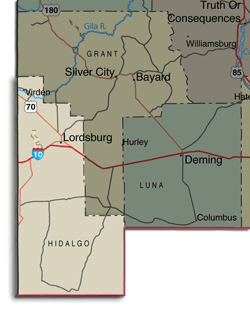How Did a Traffic Stop Turn Into a Colonoscopy?

This is going to sound like a George Saunders short story, but it really happened.
As you may have heard, a man in Southern New Mexico was subjected to a series of increasingly invasive and degrading medical procedures to search for non-existent drugs in his lower GI tract, all because a police officer thought he was standing funny during a traffic stop. Chris Ramirez of KOB4, the local TV station that broke this story, investigates how a routine traffic stop turned into a forced colonoscopy.
David Eckert’s nightmare began on January 2, 2013 with an incomplete stop at a stop sign on his way home from a WalMart in Luna County. The officer who pulled Eckert over thought he was clenching his buttocks suspiciously and obtained a warrant to perform an anal cavity search.
Eckert was taken to a nearby hospital, but the doctor refused to perform the procedure, citing an obscure concept known as “ethics.” Undeterred, the officer took Eckert to Gila Regional Medical Center in neighboring Grant County (near Truth or Consequences). According to Eckert’s medical records, obtained by KOB4, the following indignities were visited upon him:
1. Eckert’s abdominal area was x-rayed; no narcotics were found.
2. Doctors then performed an exam of Eckert’s anus with their fingers; no narcotics were found.
3. Doctors performed a second exam of Eckert’s anus with their fingers; no narcotics were found.
4. Doctors penetrated Eckert’s anus to insert an enema. Eckert was forced to defecate in front of doctors and police officers. Eckert watched as doctors searched his stool. No narcotics were found.
5. Doctors penetrated Eckert’s anus to insert an enema a second time. Eckert was forced to defecate in front of doctors and police officers. Eckert watched as doctors searched his stool. No narcotics were found.
6. Doctors penetrated Eckert’s anus to insert an enema a third time. Eckert was forced to defecate in front of doctors and police officers. Eckert watched as doctors searched his stool. No narcotics were found.
7. Doctors then x-rayed Eckert again; no narcotics were found.
8. Doctors prepared Eckert for surgery, sedated him, and then performed a colonoscopy where a scope with a camera was inserted into Eckert’s anus, rectum, colon, and large intestines. No narcotics were found.
As Eckert’s civil rights lawsuit puts it, “The colonoscopy targeted an area of the Plaintiff which is highly personal and private,” all because he was supposedly standing “with an erect posture,” “keeping his legs together.” Eckert didn’t consent to any of these procedures, but the hospital billed him anyway. He’s still gets bills for thousands of dollars, according to the lawsuit.
Eckert’s lawyers say that the warrant was invalid because it was only good for Luna County and the Gila Medical Center is located in Grant County, and because the initial search lacked probable cause. The police justified the search of Eckert’s car on the grounds that their police dog, Leo, had “alerted” them to the presence of drugs in the vehicle, but no drugs were found. In 2012, Leo “alerted” officers to drugs in Eckert’s car during a traffic stop for a cracked windshield, but no drugs were found then, either, according to the lawsuit.
How ‘bout that war on drugs, eh?

